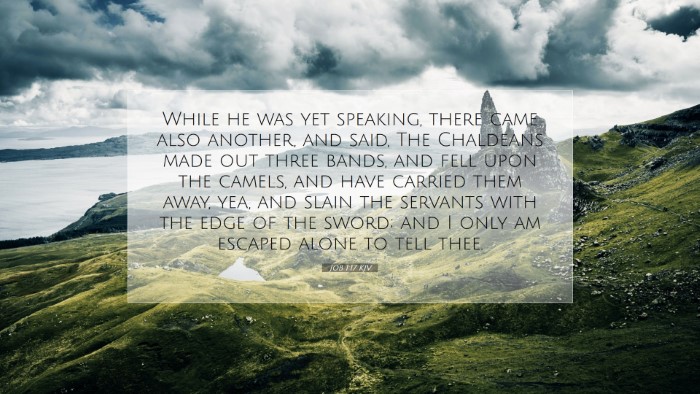Old Testament
Genesis Exodus Leviticus Numbers Deuteronomy Joshua Judges Ruth 1 Samuel 2 Samuel 1 Kings 2 Kings 1 Chronicles 2 Chronicles Ezra Nehemiah Esther Job Psalms Proverbs Ecclesiastes Song of Solomon Isaiah Jeremiah Lamentations Ezekiel Daniel Hosea Joel Amos Obadiah Jonah Micah Nahum Habakkuk Zephaniah Haggai Zechariah MalachiJob 1:17
Job 1:17 KJV
While he was yet speaking, there came also another, and said, The Chaldeans made out three bands, and fell upon the camels, and have carried them away, yea, and slain the servants with the edge of the sword; and I only am escaped alone to tell thee.
Job 1:17 Bible Commentary
Commentary on Job 1:17
This verse is a critical passage within the context of the Book of Job, presenting a stark depiction of the trials faced by Job. Understanding the implications of this verse requires examining the surrounding narrative and the theological ramifications it posits on human suffering, divine sovereignty, and the nature of trials.
Verse Context and Overview
In Job 1:17, we find the report of calamity that befalls Job through the Chaldeans:
“While he was yet speaking, there came also another and said, The Chaldeans made off with the camels and took them away; yea, and they have slain the servants with the edge of the sword; and I only am escaped alone to tell thee.”
Theological Reflections
Both Matthew Henry and Albert Barnes emphasize the sovereignty of God amidst human suffering. They suggest that Job's trials were permitted by God, not as acts of malice but as part of His divine plan. This perspective invites deeper examination of the nature of God amidst calamity.
Divine Sovereignty
Henry highlights that God allows these events to unfold, reinforcing the notion that nothing happens outside of His will. This underscores the idea that suffering, even in its most painful forms, can serve a higher purpose.
The Role of Adversity
Barnes adds that the events depicted in this passage illustrate the unpredictable nature of life’s challenges. The swift succession of calamities not only raises questions about suffering but also about the reliability of worldly possessions and the ultimate trust in God. Job’s faith is later contrasted with the fate of those who do not trust in divine providence, highlighting the value of steadfast faith.
Human Agency and Responsibility
Adam Clarke provides an interesting insight into the actions of the Chaldeans. He notes that these raids were executed by human hands, illustrating the complex interplay between divine providence and human agency. The text invites us to consider how human actions can be interwoven with God’s sovereign plan.
The Chaldeans as Instruments
Clarke suggests understanding the Chaldeans as instruments through which God executes His will, consequently provoking reflections on justice and the moral accountability of nations and individuals alike. This concept extends into discussions of the ethical implications of suffering imposed by human actions.
Lessons for Believers
From this verse, a number of lessons emerge for believers navigating trials:
- Trust in God’s Plan: Faith in divine sovereignty encourages believers to trust that there is a purpose behind their suffering, even if it is not immediately clear.
- Endurance in Adversity: Like Job, believers are called to endure suffering with patience and resilience, knowing that moments of trial can deepen their faith.
- Understanding Human Limitations: Job's experience clarifies the limitations of human understanding in comprehending divine purposes, challenging believers to rely on faith over sight.
- Preparation for Trials: The passage serves as a cautionary reminder to be spiritually prepared for sudden changes in circumstances.
Reflection and Application
In grappling with Job 1:17, pastors, students, and scholars are encouraged to engage deeply with the text to draw out its implications for ministry, personal faith, and broader theological discourse. Reflecting on this verse invites a holistic approach to suffering that acknowledges both divine sovereignty and human agency.
Preaching from Job 1:17
For pastors, this commentary encourages the incorporation of themes from Job’s trials into sermons. The invocation of Job's steadfastness amidst loss can inspire congregants during moments of despair, affirming that God’s plans often transcend human understanding.
Academic Examination
Theologically, scholars can explore how this verse fits into larger discussions about theodicy—how one reconciles the existence of evil with the notion of a benevolent God. Job’s suffering, while profound, is a narrative vehicle through which one may examine the complexities of faith in a broken world.
Conclusion
Job 1:17 serves not only as a record of calamity but as a profound theological statement about the nature of suffering and divine authority. As we reflect on this passage, we are called to recognize the intricate balance between human actions and divine oversight. Believers are challenged to uphold their faith in the face of trials, finding strength in the assurance that God remains in control, even amidst chaos.


